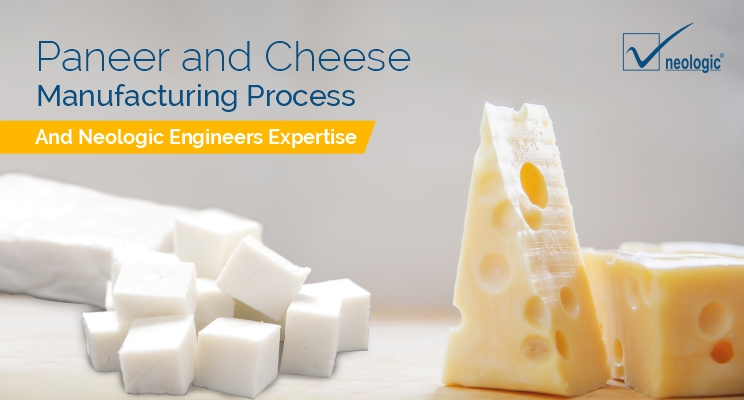
Cheese and paneer have been popular dairy products since humans started to domesticate milk-producing animals sometime around 10,000 B.C.
The curd used to produce cheese are universal, and practically every culture on the planet has formed its own methods.
Dairy processing equipment manufacturers are now offering machinery for the various processes.
Paneer, on the other hand, is a South Asian variety of soft cheese created by acid and heat curdling of milk.
It is a non-fermented, non-rented, un-ripened type of cheese that does not melt. With its versatility as an ingredient for various dishes, paneer is growing in popularity throughout the world.
With technology progressing, dairy farmers ordinarily use machines for processing the milk and several other techniques. The paneer manufacturing and cheese manufacturing processes involve several steps such as:
- Standardization of Milk
- Heat treatment
- Coagulation
- Draining the whey
- Pressing and draining
- Aging in cold chambers (as with Cheeses)
- Treat with chilled water (as with Paneer)
- Portioning & Packaging
These are the essential factors to be considered while making cheese. If we talk about previous years, then dairy farmers carry out the cheese and paneer processing manually.
Standardized milk is usually standardized before cheese manufacturing to optimize the ratio of protein to fat and make quality cheese with a high yield. Dairy equipment manufacturers offer the technology to ensure the requisite quality requirements are met.
Quality Control in Cheese and Paneer Manufacturing
Neither cheesemaking nor paneer processing is an easily-regulated scientific process. As a result, quality cheese has always been the mark of an accomplished, maybe even a lucky cheese maker persistently producing delicious cheese.
Producing a single set of cheesemaking standards is challenging because every variety of cheese has its own spectrum of characteristics. A cheese that deviates from this spectrum will be considered bad-tasting and inferior. But standardized equipment from dairy processing equipment manufacturers has come a long way in ensuring a more balanced yield.
One controversy in the field debates the necessity of pasteurization of the milk used in the cheese. Pasteurization was encouraged due to the existence of Mycobacterium tuberculosis, a pathogen that occurs in dairy products.
But often, regulations for pasteurization exist to ensure that the consumer can acquire authentic cheeses with comfort while reducing the threat of diseases. Neologic Engineers manufacture dairy pasteurizer that meets and comply with all the statutory and quality regulations.
As making cheese is simultaneously an art and a science, dairy machinery manufacturers work hard to ensure the science side is taken care of. Cheesemakers depend on measurements of pH levels and inoculations of precise molds as they do their own judgments and senses of sight, touch, texture, taste, and smell.
In addition to satisfying compositional standards, cheese and paneer must also meet flavor, fragrance, body texture, softness, and appearance requirements.
To test a batch of cheese, producers carry out testing at various stages of production.
Cheese has regularly designated points for all of these characteristics, with an inspector examining the end product to discover any inconsistencies in the composition and the properties defined above.
And because cheese is produced for human consumption, exceptional care is demanded to ensure that the ingredients used are of the highest quality, and cheese meant for export must satisfy incredibly stringent quality control measures. Neologic Engineers provide quality machinery for paneer processing lines and cheese processing lines to ensure the processes are run smoothly under the controlled guidelines and the manufacturers can produce Paneer and Cheese of the same high quality each day that meet the customer expectations.